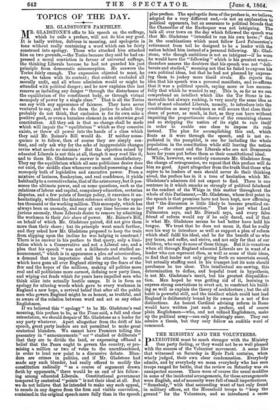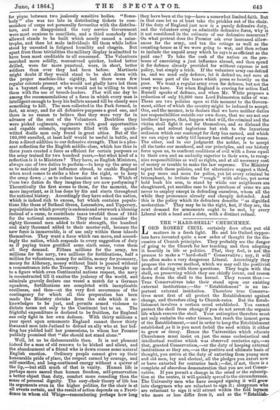THE MINISTRY AND THE VOLUNTEERS. P ATRIOTISM must be much stronger
with the Ministry than party feeling, or they would not be so well pleased with the success of the Volunteer movement. A scene like that witnessed on Saturday in Hyde Park contains, when wisely judged, their own clear condemnation. Everybody admits, and by everybody we mean everybody who has seen troops ranged for battle, that the review on Saturday was an unexpected success. There were of course the usual muddles in some of the incidental arrangements, for those arrangements were English, and of necessity were full of small imperfections. "Somebody," with that astounding want of tact only found in military offices, set the Household troops to "keep the ground" for the Volunteers, and so introduced a cause for pique between two jealously sensitive bodies. "Some- body" else was too late in distributing tickets to com- manders of corps not personally favourites with the distribu- tors, and so disappointed the very service Government were most anxious to conciliate, and a third somebody first allowed stands to be built which nearly caused a catas- trophe, and then let male individuals fill them while ladies stood by unseated in fatigued humility and chagrin. But apart from these trivialities the military display is admitted to have been most creditable to all concerned. The Volunteers marched more solidly, manucevred quicker, looked better drilled, were far more punctual, were, in short, better soldiers than ever they had been before. Martinets might doubt if they would stand to be shot down with the proper machine-like rigidity, but there were few regular colonels present who would not gladly have led them in a bayonet charge, or who would not be willing to trust them with the use of breech-loaders. That will one day be among the recommendations of a force in which every man is intelligent enough to keep his bullets unused till he clearly sees something to kill. The men collected in the Park formed, in fact, an army, and for all defensive purposes a good one, and there is no reason to believe that they were very far in advance of the rest of the Volunteers. Doubtless they were picked iegiments, regiments with good opportunities and capable colonels, regiments filled with the quick- witted docile men only found in great cities. But of the 160,000 enrolled, at least half would be useful in battle, and form a direct addition to our defensive strength. That is a plea- sant reflection for the English middle-class, which has thus in three years created a force as efficient for certain purposes as the army trained for two hundred years,—but what kind of a reflection is it to Ministers ? They have, as English Ministers, always one of two duties to perform—to keep up the army so as to maintain our just influence abroad, to enable England when need comes to strike a blow for the right, or to keep the army down as to reduce taxation at home. Which of these two duties do they imagine they are now performing? Theoretically the first seems to them, for the moment, the more important, as it has done by fits and starts throughout the national history. Accordingly they have asked the nation, which is indeed rich to excess, but which contains popula- tions like those of Bethnal Green, Lancashire, and Tipperary, populations in which poverty is endemicand overwork a blessing instead of a curse, to contribute taxes twofold those of 1845 for the national armaments. They refuse to consider the eighty thousand men added to their strength, the hundred and sixty thousand added to their muster-roll, because the new force is immoveable, is of use only within these islands themselves. They want a force which can move, and accord- ingly the nation, which responds to every suggestion of duty as if paying taxes gratified some sixth sense, votes them all they demand. Fifteen millions for the army, ten millions for the navy, two millions for fortifications, half a million for volunteers, money for militia, money for yeomanry, money for Alderney, money without limit is poured without a remonstrance into the Treasury. The army is brought up to a figure which even Continental nations respect, the navy is reconstructed till it excites the jealousy of the world, and admirals gravely declare one vessel a match for a German squadron, fortifications are completed with inexplicable costliness, and then—at the very first occurrence of the contingency for which all this preparation has been made the Ministry shrinks from the side which it ac- knowledges to be just, and .permits armed violence to dictate terms not only to the Continent but to us. The frightful expenditure is declared to be fruitless, for England can only fight in her own defence. With thirty millions a year spent upon armaments England cannot throw thirty thousand men into Jutland to defend an ally who at her bid- ding has yielded half her possessions, to whom her Premier publicly promised that "she should not stand alone."
Well, let us be dishonourable then. It is not pleasant indeed for a man of old renown to be kicked and silent, and the abandonment of a friend who is down rouses some natural English emotion. Ordinary people cannot give up their honourable pride of place, the respect earned by courage, and self-sacrifice, and long-continued energy without a quiver of the lip,—but still much of that is vanity. Human life is perhaps more sacred than human freedom, self-preservation a better object than duty, comfort more consoling than the sense of personal dignity. The easy-chair theory of life has its arguments even in the higher politics, for the chair is at all events certain, and the result of action depends on a Provi- dence in whom old Whigs—remembering perhaps how long they have been at the top—have a somewhat limited faith. But in that case let us at least take the prickles out of the chair. If the duty of England just now is a purely defensive duty, and the volunteer army an admirable defensive force, why is it not considered in the estimate of our defensive resources? On what pretext does the Premier ask ever increased allow- ances for the army, and tax the cottage as well LLB the counting-house as if we were going to war, and then refuse to include the unpaid army which he says is as efficient as the paid one ? To take the cash of the nation on the pre- tence of exercising a just influence abroad, and then spend it for defence already provided for without expense is not policy, but simply a trick. If the volunteer army can defend us, and we need only defence, let it defend us, and save at least some part of the taxes which press so heavily on the poor. We want a regular army even for defence, but not the army we have. Yet when England is craving for action Earl Russell speaks of defence, and when Mr. White proposes a reduction of only 10,000 men Lord Palmerston talks of war. There are two policies open at this moment to the Govern- ment, either of which the country might be induced to accept. One, and the meaner, is to declare that we have neither duties nor responsibilities outside our own doors, that we are not our brothers' keepers, that, happen what will, the criminal and the victim shall fight it out for themselves, and so disband the police, and retreat inglorious but rich to the luxurious seclusion which our contempt for duty has earned, and which we can enjoy in safety till luxury has rotted away our bones. The other, and in our judgment the nobler, is to accept all the tasks our manhood, and our principles, and our history force upon us, to confront coalitions of evil with a force equal to their own and an audacity superior to their own, to recog- nize responsibilities as well as rights, and at all necessary cost of money or trouble to make the law supreme. The Ministry reject both these policies, and for alternative suggest a third, to pay more and more for police, yet let every criminal be triumphant, to irritate the "rough" with advice, yet never hold back his arm, to stand by while our neighbours are slaughtered, yet sacrifice ease to the purchase of arms we are never to employ except in defending ourselves, whom all the while they pronounce already and cheaply defended. And this is the policy which its defenders describe "as dignified moderation." They may be in the right, but, if they are, the next demand for armaments ought to be met, by every Liberal with a head and a slate, with a distinct refusal.































 Previous page
Previous page